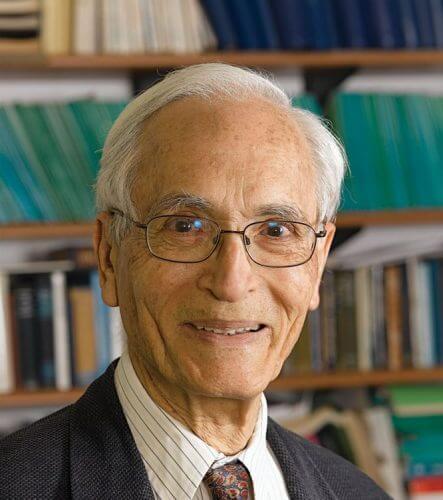Research Prof. Yaakov Ziv from the Viterbi Faculty of Electrical Engineering at the Technion - recipient of the A.M.T. for the year 2017

A.M.T. Award It will be awarded on Thursday, November 9, 2017, to Research Professor Emeritus Yaakov Ziv, from the Viterbi Faculty of Electrical Engineering at the Technion, for his great contribution in the fields of information and communication.
The award is given every year under the auspices of the Prime Minister for excellence and academic or professional achievements that have a far-reaching impact and for a special contribution to society. This year, the prize is awarded for the first time in the category of computer and electronics engineering, and Prof. Ziv is the first to win it.
Prof. Ziv, born in 1931, completed a bachelor's and master's degree at the Faculty of Electrical Engineering at the Technion, followed by a doctorate at MIT (in 1962). After about eight years in research and development (at Raphael and Bell Laboratories in the United States) he joined the Technion faculty. Over the years, he won prestigious awards including the BBVA Fund's Front of Knowledge Award, the Israel Award for Exact Sciences, the Israel Security Award (twice), the Marconi Award, the Richard Hemming Award and the Shannon Award. He held senior positions, including the vice president of the Technion for academic affairs, the chairman of the Israel Academy of Sciences and the president of the Israel Academy of Sciences and was a member of leading American and European associations.
Ya'akov Ziv was born in Tiberias in late 1931. When he was 3 years old, the family moved to Ra'anana, where his father, Ben Zion Ziv, ran the "Maged" school; The "Ziv" school in Ra'anana is named after him. Ben Zion taught the children Hebrew grammar and Talmud, but Jacob was always drawn to engineering. He remembers a house full of books, including a book in Russian about the electrical engineer Guglielmo Marconi, winner of the Nobel Prize in Physics in 1909. Jacob read the book at the age of 11, with the help of a Russian-Hebrew dictionary, and when he finished, his son transmitted according to the instructions in the book with the addition of improvisations. He waited impatiently for his parents to leave the house and then plugged in the transmitter. At that moment a large explosion was heard and the light in the house went out, but for Yaakov this was the beginning of the road to the prestigious Marconi Prize which he won decades later.
He fondly remembers his studies at Herzliya Gymnasium High School and especially Karmi Yogev, a math and physics teacher and later the director of the gymnasium. However, his studies were interrupted due to the war of liberation, and Jacob was drafted at the age of 16. At the end of the war, he returned to school and quickly finished his studies. After regular service in the army as a radar technician, he began studying at the Faculty of Electrical Engineering at the Technion, went on to a master's degree and was accepted to Rafael. With the encouragement of the head of the scientific unit at the Ministry of Defense, Ernest David Bergman, he went on to pursue a doctorate in information theory at MIT, from where he returned to Rafael as head of the communications department and brought the first transistors to Israel.
It was Prof. Moshe Zakai, who was the dean of the Faculty of Electrical Engineering in the early 70s, who brought Prof. Ziv to the Technion. Together with Prof. Israel Zederbaum and Prof. Israel Bar David, the two brought about a revolution in the faculty that marked the beginning of the Israeli start-up nation and later gave birth to the Faculty of Computer Science at the Technion.
With Prof. Avraham Lampel from the Faculty of Computer Science, Prof. Ziv developed in 1977 the Lempel-Ziu algorithm, which served as a basis for essential compression technologies such as TIFF, PNG, ZIP and GIF and played a central role in the PDF (for documents) and MP3 (for music) formats. This is an information compression algorithm that allows compression without loss of information (lossless compression), independent of the data structure and without prior knowledge of their statistical properties. Many of the compression technologies used today in memory devices, computers and smart phones were developed on the basis of this algorithm.
Prof. Ziv also participated in the development of the Weiner-Ziv algorithm at Bell Laboratories. This algorithm, which is now part of Microsoft's operating system, enables the compression of many images from different cameras, for example in football matches, and their transmission at the same time.
According to Prof. Ziv, "Computer and electronics engineering is a new category in the A.M.T. award. And I am very happy about her addition and hope that in the future more winners from the Technion will join me. The training we received at the Technion in the exact sciences was really excellent. Thanks to this, I was able to lead Rafael in the field of transistors that no one knew about in Israel. In research in computer and communication engineering, it is customary to define the mathematical barriers of future system performance, and in the next step try to get as close to these barriers as possible through software and hardware. In the case of the Ziv-Lampel algorithm, we proved the claim we wanted to prove, and the algorithm became a basic building block in many applications."

One response
I studied with him. Dear men.